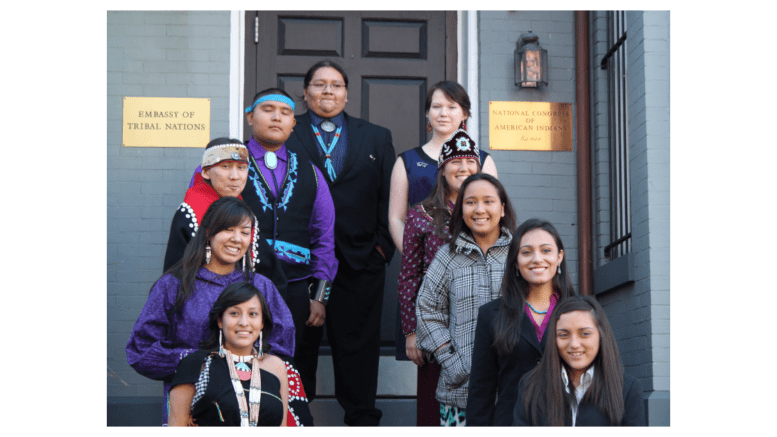Two days before the World Series comes to Cobb County for game 3, the National Congress of American Indians issued a statement on the use of team mascots, logos and symbols that parody and stereotype Native peoples, including the Atlanta Braves name, and the “tomahawk chop.”
We’re reprinted the statement below, with permission:
NCAI Reiterates Longstanding Opposition to Atlanta Braves’ Mascot and “Tomahawk Chop” Fan Ritual as Team Plays in World Series
WASHINGTON, D.C. | Today, the National Congress of American Indians (NCAI) issues the following statement in light of the Atlanta Braves’ participation in the World Series and yesterday’s comments by Major League Baseball Commissioner Rob Manfred condoning the team’s continued use of its mascot and performance of its “tomahawk chop” fan ritual:
“Yesterday, Commissioner Manfred stated that the question of whether the ‘Braves’ mascot and ‘tomahawk chop’ fan ritual are offensive to Native people is only a local issue. He similarly asserted the league does ‘not market our game on a nationwide basis.’ Nothing could be further from the truth. Major League Baseball is a global brand, it markets its World Series nationally and internationally, and the games played in Atlanta this weekend will be viewed by tens of millions of fans across the country and around the world. Meanwhile, the name ‘Braves,’ the tomahawk adorning the team’s uniform, and the ‘tomahawk chop’ that the team exhorts its fans to perform at home games are meant to depict and caricature not just one tribal community but all Native people, and that is certainly how baseball fans and Native people everywhere interpret them,” said NCAI President Fawn Sharp. “Consequently, the league and team have an obligation to genuinely listen to Tribal Nations and leaders across the United States about how the team’s mascot impacts them. NCAI, a consensus-based congress composed of hundreds of Tribal Nations from every region of this country, has made its categorical opposition to Native ‘themed’ mascots abundantly clear to sports teams, schools, and the general public for more than five decades. In our discussions with the Atlanta Braves, we have repeatedly and unequivocally made our position clear – Native people are not mascots, and degrading rituals like the ‘tomahawk chop’ that dehumanize and harm us have no place in American society. NCAI calls on the team to follow the example set by the Cleveland Guardians, and we call on Major League Baseball and the FOX Broadcasting Company to refrain from showing the ‘tomahawk chop’ when it is performed during the nationally televised World Series games in Atlanta.”
###
About The National Congress of American Indians (NCAI):
The oldest, largest, and most representative national organization serving Tribal Nations and their citizens, NCAI has been leading Indian Country’s movement to eradicate offensive Native “themed” mascots from sports and popular culture since 1968. NCAI’s membership has passed several consensus-based resolutions on the issue, including one stating in part, “The use of ‘Native American’ sports mascots, logos, or symbols perpetuates stereotypes of American Indians that are very harmful. The ‘warrior savage’ myth…reinforces the racist view that Indians are uncivilized and uneducated and it has been used to justify policies of forced assimilation and destruction of Indian culture.” NCAI’s relentless advocacy has helped to fuel the rapidly growing national movement among sports teams to retireoffensive and harmful Native “themed” mascots, including more than two dozen public schools that have retired their “Braves” mascots in a gesture of respect towards Tribal Nations and peoples. For more information, visit www.ncai.org.

